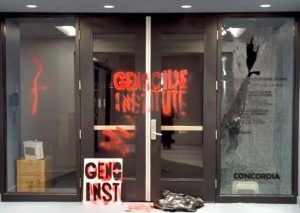It was in my second year of teaching when Jane Jacobs died. I knew Jacobs as the community organizer who ensured that Toronto’s Allen Expressway didn’t go south of Eglinton Avenue and New York’s West Side Highway ended in the 40s. Stuck in traffic, I had often taken my frustration out on Jacobs. The CBC’s retrospective on her, however, explained her philosophy and informed my thinking about Jewish community.
Cars, Jacobs argued, close off community. By stepping into a car and shutting the door, we close the door on our neighbours and isolate ourselves. A vocal advocate for public transit, Jacobs saw buses and trains as a way of building community.
At the time of her death, I was commuting from the school where I was teaching to the university where I was completing a master’s degree. I decided I’d follow Jacob’s advice and take the bus. The first day, I parked my car, got on the bus and sat down, ready to build community. I turned to my left and found a person plugged into an iPod, then turned to my right and found someone talking on his cellphone.
While this experiment in community building failed, it underscored the importance of setting and construct when it comes to community. Talking recently with a colleague about her own Jewish journey, I was struck by the reasons she offered for why she exposed herself to various experiences. She went to camp because her best friend was going. She went to a youth group because there was a cute guy there. And she goes to synagogue because of the programs for her kids. The social networks we weave both bring us to Jewish experiences and reinforce their impact on our lives.
In their book, Connected: The Surprising Power of Our Social Networks and How they Shape our Lives, Nicholas Christakis and James Fowler explain that “the social influence does not end with the people we know. If we affect our friends, and they affect their friends, then our actions can potentially affect people we have never met.” Christakis and Fowler chart the impact that social networks have on nearly every aspect of our lives – from smoking and weight to economics and politics.
People who work in settings of immersive Jewish learning have known this for decades. The power of day schools, camps and Israel trips is not only in the taught curriculum, but is fuelled by the sociology of the group experience – setting norms for communal living and shared expectations of peers. The educators who create these experiences pour hours of diligent thought into how to construct the setting, activities and unstructured time to maximize these community experiences. The peer-to-peer reinforcement of values is critical to their success in forging strong Jewish identities.
Jacob’s philosophy, however, taught me that the power of the connected social network goes beyond the curated environments of schools, shuls and camps.
Jewish neighbourhoods are important crucibles for the development of Jewish life and identity. Thousands of families make a conscious decision to live in Jewish neighbourhoods, even thought other areas of town may be less expensive. In Toronto, Thornhill Woods’ growing population of young families is a prime example. In deciding to live there, families are implicitly saying that they want their children to grow up in a particular social, cultural and religious milieu. While we don’t have tools to measure it, Jacobs, Christakis and Fowler would agree that the nature of connected communities powerfully reinforces the values we want our families to have.
In a gastronomical culture like ours, it’s easy to say that you are Jewishly what you eat. In truth, you are who you’re connected to, and the challenge to us as a community is to think about how we build and maintain those connections.
Daniel Held is executive director of the Julia and Henry Koschitzky Centre for
Jewish Education at UJA Federation of Greater Toronto.






